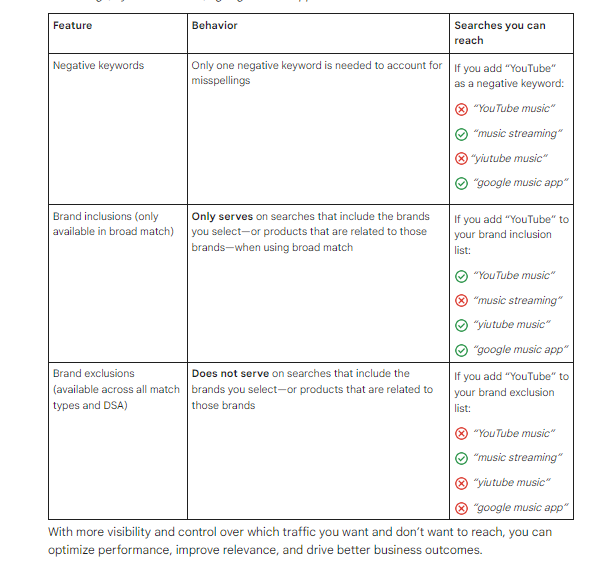Google Ads has announced several updates aimed at enhancing how search queries are matched and providing advertisers with greater control over brand-related traffic.
Oliver Kiderle, Senior Product Manager, Google Ads
“Breakthroughs in AI are helping us tackle questions in ways Google Search has never done before. That’s why we’re continuously improving AI-powered broad match, to help you reach your customers no matter how they’re searching.
As one example, in the last six months, AI-powered improvements to quality, relevance, and language understanding have improved broad match performance by 10% for advertisers using Smart Bidding.”
Search Term Reporting
Google will now aggregate misspelt search queries with their correctly spelt counterparts in search term reports. This change aims to give advertisers greater visibility into search terms, revealing an average of 9% more search terms previously hidden under the “Other” category due to privacy thresholds.
Oliver Kiderle, Senior Product Manager, Google Ads
“It’s common for words to be misspelled on Search—for example, there are at least 1.5 million ways to misspell “YouTube” on Google Search. Google Ads already matches misspelled queries to their correctly spelled keywords.
However, search terms must meet privacy thresholds to appear in the search terms report, and many misspelled queries do not meet that threshold.”
Business Impact
- Enhanced Insights: Advertisers gain a more comprehensive understanding of user search behaviour, enabling more precise targeting and keyword optimisation.
- Improved Keyword Strategy: By seeing a broader array of search terms, businesses can refine their keyword lists to include variations and misspellings that are now visible, potentially capturing more relevant traffic.
- Data-Driven Decisions: With access to more complete data, advertisers can make better-informed decisions about their campaigns, ultimately improving performance and ROI.
Negative Keyword Functionality
Managing negative keywords will become more efficient as Google Ads automatically blocks misspellings of words added as negative keywords. This update will reduce the manual effort required to manage these lists, allowing advertisers to exclude all variations of a keyword with a single negative keyword entry.
Oliver Kiderle, Senior Product Manager, Google Ads
“We’ve also applied the misspellings behavior mentioned above to negative keywords. Before, you needed to add all misspellings of each keyword if you wanted to exclude them. Now, you can exclude all 1.5 million variations of “YouTube” with one negative keyword.”
Business Impact
- Time Efficiency: Reducing the need for extensive lists of negative keywords saves time and simplifies campaign management, allowing marketers to focus on strategic tasks.
- Cost Savings: By automatically blocking unwanted traffic, businesses can reduce wasted ad spend on irrelevant clicks, improving the overall efficiency of their advertising budget.
- Enhanced Precision: Ensuring that ads do not appear for misspelt or irrelevant queries increases the relevance of the traffic, leading to higher conversion rates and better campaign outcomes.
Brand Inclusions for Broad Match
Google is introducing a “brand inclusions” feature for broad match campaigns. This feature allows advertisers to limit their ads to queries related to specified brand names, providing more control over when and where their ads appear.
Advertisers can now identify and act on opportunities through a new brand inclusions recommendation on their Recommendations page.
Business Impact
- Targeted Reach: Advertisers can ensure that their ads are shown only in the context of relevant brand-related searches, improving the quality of traffic and the likelihood of conversions.
- Optimized Spend: By limiting ads to specific brand-related queries, businesses can avoid spending on irrelevant or less valuable traffic, maximizing the effectiveness of their ad budget.
- Strategic Flexibility: The ability to include or exclude certain brands in broad match campaigns allows advertisers to tailor their strategies based on competitive dynamics and brand objectives, enhancing overall campaign performance.
Brand Exclusions Expansion
Previously available only in Performance Max campaigns, brand exclusions will now apply to all match types and Dynamic Search Ads (DSA). This feature allows advertisers to exclude specific brands across all match types, helping to block traffic from unwanted brand searches, including misspellings and other variants.
Business Impact
- Brand Protection: Businesses can prevent their ads from appearing alongside competing brands, safeguarding their brand positioning and reducing the risk of negative associations.
- Focused Targeting: By excluding certain brands, advertisers can concentrate their efforts on more relevant and potentially profitable traffic, enhancing the effectiveness of their campaigns.
- Performance Optimization: Regular monitoring and adjustment of brand exclusions can help businesses maintain a balance between reach and relevance, ensuring that their ads drive valuable conversions without unnecessary expenditure.




RECOMMENDED FOR YOU
Google Analytics Launches New AI “Generated Insights”
Google has introduced a new feature in Google Analytics…
Google has introduced a new feature in Google Analytics…
[STUDY] Google Still #1 For Online Reviews
Fifteen years on from the first edition, BrightLocal’s Local…
Fifteen years on from the first edition, BrightLocal’s Local…
[NEW STUDY] Longer Short-Form Videos Dominating
Video consumption habits are shifting once again, and this…
Video consumption habits are shifting once again, and this…